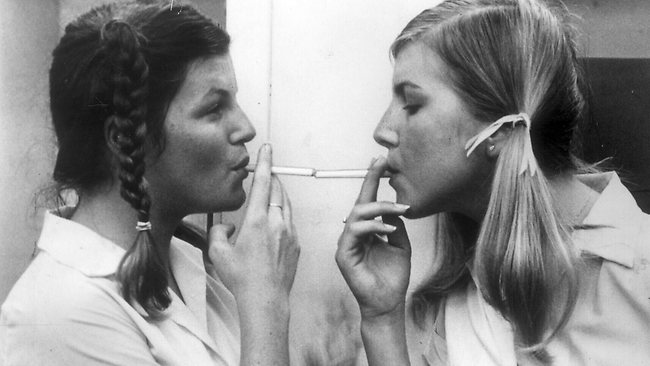Women in Film: Puberty Blues - A Retrospective
Lead actresses Nell Schofield and Jad Capelja in a production still from Puberty Blues (1981).
“The film is feminist in a way. I think it is also a comment on peer group pressure, male chauvinism in teenage groups, school and parent hassles.” -- Nell Schofield
With the impending release of an 8-part television series from Network Ten that is, ironically enough, set in the same Cronulla locale as the currently-on-air botox enhanced reality show, The Shire, I thought it would be fitting to revisit the original 1981 classic as directed by Bruce Beresford.
Why did a film about two teenage girls growing up in beach-side Sydney shake up the local industry and concurrently resonate with so many, especially young, audience members?
Based on the unapologetic novel, co-written by Gabrielle Carey and Kathy Lette, the bluntly titled Puberty Blues was a refreshing change to the whimsical, starry-eyed point of view most other young adult novels of the time had to offer. Although not every crucial issue addressed in the book was faithfully adapted from page to screen (the topic of abortion was diluted to a distressful late period), many other concerns including the misogyny of surf culture, and teenage retaliation in the form of drugs and underage sex against the backdrop of a middle-class suburban existence were explored in a way that gained empathy from its largely teenage audience, and made critics of the time write it off as a 'crass attempt' at competing with its American contemporaries.
Debbie and Sue, best friends and just on the outskirts of the high school social sphere are desperate to become a part of the Greenhill Gang; the cool kids, the "surfies" and will try just about anything to get in. Social climbing isn't the only issue explored here, though -- the film also sheds light on the girls' decision to take charge, ditch towel duty and fetching Chiko rolls for their boyfriends in favour of taking to the waves and surfing for themselves.
Lesley Speed, author of When the Sun Sets Over Suburbia... for the Journal of Media & Cultural Studies reflects that "Cronulla surf culture serves as a prism" through which we can observe Australian youth culture.
Considering the 30 year gap between the original film and the newly re-booted series, it will be interesting to see which aspects of the book are once again adapted, and if the attitudes of audiences and network regulations in 2012 will allow for some of the more grittier questions the original co-authors asked as opposed to a possibly disappointing sugar coated nostalgic sheen over the narrative?
Let's hope the former carries through in the new series staring Claudia Karvan, Brenna Harding and Ashleigh Cummings, airing shortly after the London Olympics as part of Ten's new season of television.
Nathania Gilson is a young filmmaker living in Melbourne, Australia. She has spent the last three years working on a number of short films, music videos and documentaries. Her side projects involve curating content for independent publications, adventuring and maintaining the ability to function on minimal sleep. She is excited about the future.

